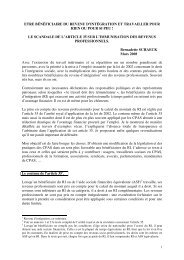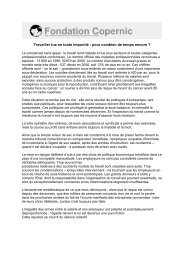Awra Amba RJ 300612 EN - Contacter un comité local d'Attac
Awra Amba RJ 300612 EN - Contacter un comité local d'Attac
Awra Amba RJ 300612 EN - Contacter un comité local d'Attac
You also want an ePaper? Increase the reach of your titles
YUMPU automatically turns print PDFs into web optimized ePapers that Google loves.
<strong>Awra</strong> <strong>Amba</strong>, a current experiment of utopian socialism<br />
4.4. Family<br />
The family is one of the pillars of the social organisation. We describe it below through marriage,<br />
divorce and homestead building.<br />
4.4.1. Marriage<br />
Traditionally the boy has not even known what his bride looks like <strong>un</strong>til the wedding itself (Levine,<br />
1965/101). This practice is still prevalent in the rural areas of the region. The parents play an<br />
important role in the choice of the partner of their son or daughter and carefully inspect the families<br />
of potential partners of their child. Once the marriage is decided, the two families enter in<br />
competition in preparing costly feasts for the occasion, in order to show their social status. The boy<br />
who dares to choose a wife on his own commits an offense for which the father has the moral right to<br />
curse and disinherit him. Marriage is regarded as a bond between families, not between individuals<br />
(At05/46-47).<br />
In the Amhara region, the median age of the first marriage was 15.2 years for women aged 20 to 24<br />
in 2005, slightly higher than 14 years for women aged 25 to 44, and 13.6 years for women aged 45 to<br />
49. Girls marry therefore very early, especially in comparison with other Ethiopian peoples like<br />
Oromos, to the south, who marry aro<strong>un</strong>d 3 years later (EDH, nd). Early marriage is especially<br />
frequent in the rural zones according to a study quoted by Ya08/80. As immediate effect, girls drop<br />
automatically out of school. In the longer term, psychological problems occur because of their<br />
loneliness, whereas they should be at school and play with their friends (IPS, 2010). In 2005,<br />
Ethiopia recognized early marriage harms yo<strong>un</strong>g girls, and set the minimum age of marriage at 18<br />
years (IPS, 2010).<br />
The median age for the start of sexual relations of women is slightly higher than the median age of<br />
the first marriage: it highlights the importance of virginity for the girls. Finally, 22 % of the men are<br />
polygamous (CSA, 2006).<br />
In <strong>Awra</strong> <strong>Amba</strong>, marriage is the business of the yo<strong>un</strong>g people, without the parents playing any role<br />
according to At05/41 & 79 and Yi07/48, with little or no intervention from ascendants or close<br />
relatives according to Me09/38. Nearly 98 % of the adults interviewed by Ya08/80 assert marriages<br />
are established by the agreement of the partners, without any interference of their families. Yirga<br />
(2007/48) states moreover, quoting Zumra, the families should approve the <strong>un</strong>ion of their children in<br />
view of the formalities. It appears therefore that interference of families is the exception, the parents<br />
being only informed about the <strong>un</strong>ion of their children, who are financially and materially responsible<br />
for their couple (Yi07/49). The comm<strong>un</strong>ity approves the marriage after three to five older people<br />
have verified the minimal age of the yo<strong>un</strong>g people and their agreement (awraamba, nd).<br />
The couple's parents can give them gifts (At05/41; Yi07/49). But the dowry system and other<br />
property arrangements have been abolished. There is no wedding ceremony, contrary to Amhara<br />
custom (At05/81), because it is considered as a waste of resources. The comm<strong>un</strong>ity members also<br />
never participate in wedding ceremonies of other comm<strong>un</strong>ities (Yi07/49). The prestige of a wife does<br />
not depend on the social status of her husband (wealth, leadership, membership of a management<br />
committee of the comm<strong>un</strong>ity, education).<br />
The groom and the bride both live either with the groom's parents or the bride's parents, <strong>un</strong>til they<br />
have built their own house (At05/41).<br />
Over the last 25 years, the taboo of incest, which prohibits any consanguine marriage till the 7 th<br />
generation in the Amhara region, has been eased to 4 or 5 generations, in order to deal with the lack<br />
of opport<strong>un</strong>ities of exogamous partners according to At05/41: the people from outside the<br />
comm<strong>un</strong>ity are little attracted by a life in the comm<strong>un</strong>ity whose culture is very different, and the<br />
neighbouring comm<strong>un</strong>ities ban any marriage with an <strong>Awra</strong> <strong>Amba</strong> member. Zumra stated (Yi07/50)<br />
52 / 85

















